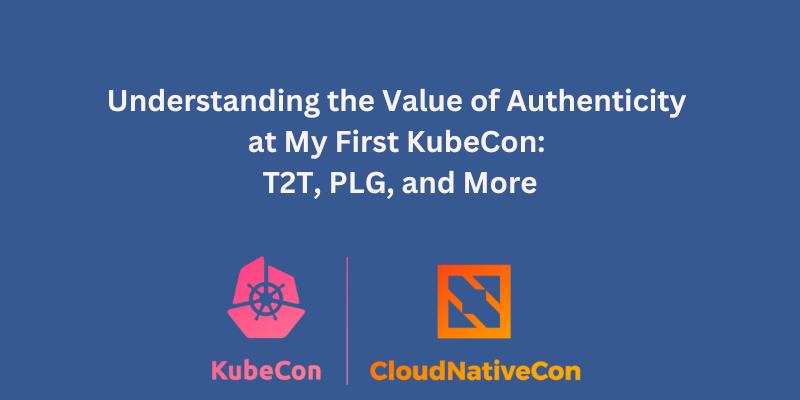When the first day of KubeCon begins in Detroit, I know exactly what to expect: a thriving, energetic community event. Since Kubernetes, also called K8s, was released as an open-source project in 2015, it’s seen a stratospheric rise in popularity. Nearly everyone (96%) who responded to a survey by the Cloud Native Computing Foundation said they’re evaluating or using Kubernetes.
KubeCon is where the best and brightest minds meet to drive the industry forward. There are now 5.6 million active Kubernetes developers, but this exponential growth has brought challenges as well.
Two key drivers are moving the market: bottom-up adoption by developers and product-led growth (PLG). Since Kubernetes is an open-source, it’s been shaped by an expanding ecosystem of third-party services and integrations. Some companies treat these opportunities like a feeding frenzy and see KubeCon as a chance to sell products and gain leverage. Most of the Kubernetes community rejects this approach—it’s better to be known as a knowledgeable, authentic resource first.
Disappointingly, some sponsors at KubeCon Valencia last spring failed to pick up on the vibe, as Ofir observed. Instead, they tried to get attention with high-level concepts. Those vendors didn’t fully understand the audience: developers who came to learn specific technical practices.
KubeCon Sponsors Are Targeting a Technical Audience
If you’re sponsoring KubeCon, you’re not going to connect with C-level executives. KubeCon attendees are tech practitioners: DevOps and R&D professionals who could probably be successful academics on the side. Instead, they’re taking a hands-on approach to cybersecurity implementation, data and disaster recovery, cloud cost management, migrating external applications in Kubernetes clusters, and a myriad of other things.
These are experts who need serious solutions for the serious problems they’re expected to solve every day. They are people who are not easily convinced by high-level marketing messaging.
They’re also part of an open-source community where sales pitches fall flat. Kubernetes enthusiasts are happy to kick salespeople out of online forums and groups, so imagine how they treat them in real life.
So what approach should KubeCon sponsors take to connect with this audience?
Reaching Tech Practitioners: Tech-to-Tech (T2T)
At KubeCon, sponsors are in the world of tech-to-tech (T2T) communication. In other words, reaching this audience requires distributing highly technical content that is valuable, educational, and helps solve challenging problems.
Even the best writer at a creative agency will have a hard time connecting authentically with this audience. They’re looking for content written by expert practitioners—senior DevOps or cloud architects. The content has to be accurate and actionable. Convincing this audience to trust your brand starts with making sure the content fixes real problems and is error-free.
At IOD, we know a lot about targeting developers with tech content. Successful T2T content is built around four pillars:
- Target tech: Create technical content that educates practitioners in line with their level of proficiency.
- Start with how-tos: Create content that helps practitioners solve a problem. Ideally, it should be search-engine friendly so developers don’t have to rely on forums, message boards, or community threads to dig up an answer.
- Authenticity is key: Make sure the content is authentic and helpful. Don’t waste their time by trying to sell because this deeply erodes the audience’s trust.
- Keep it up-to-date: Keep your tech content engaging and fresh while adding value.
IOD is uniquely able to deliver T2T content, given our editorial model and extensive history with industry-leading upstarts. So what makes KubeCon especially important for us?
What Brings IOD to KubeCon
There’s incredible momentum driving the K8s community, and it’s still growing: As of last year, 72% of respondents expect to increase container usage. This is a wide-open space where no company has established dominance. New businesses arise every day with ingenious ideas for solving big problems.
These companies emerging in the K8s space are the perfect type for IOD to work with. Tech content is essential for building credibility and educating audiences—goals that help define a business from its earliest days. What makes our approach special is IOD’s pool of tech experts.
Over the years, we’ve built an excellent community of DevOps, cloud, and cybersecurity thought leaders. These are pros who often spend their days working in the field before moonlighting with IOD. They love sharing their expertise, and when we pair them with strategists and editors, they produce material that supports the complex goals of upstart tech companies. Our experts create useful content in the form of blog posts, ebooks, and technical guides complete with code snippets, as well as whitepapers, infographics, how-to guides, videos, and even social media micro-messages.
We’ve cultivated a community and knowledge base that helps us intimately understand the problems that rising tech companies in the Kubernetes space are facing. We have a unique ability to strategically bring out the best in tech and marketing teams. Most importantly, we’ve developed a methodological tech content machine that can bring a business strategy to life.
Conclusion
We’re thrilled to see how the Kubernetes community is thriving. At IOD, we believe the future of tech is cloud-native, and the future of the cloud is agnostic.
We’re a few years late to the K8s party, but we already feel right at home. If you’re attending Kubecon + CloudNativeCon in Detroit, October 24-28, meet us in person! We’ll be visiting our clients’ booths and giving away plenty of swag.
See you there!


